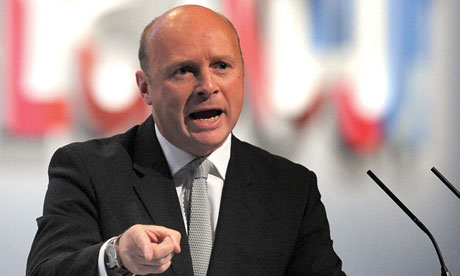
Shadow work and pensions secretary Liam Byrne will announce the new hate-crime charge amid concern the system is failing disabled people. Photograph: Andrew Yates/AFP/Getty Images
Labour will legislate to introduce a specific criminal charge of disability hate crime amid growing evidence that victims are being let down.
Liam Byrne, the shadow work and pensions secretary, will announce the policy at his party’s conference on Sunday.
He will also reveal that he intends to sack Atos, the controversial company which adjudicates on people’s ability to work, due to its poor record. Two in five assessments are appealed against and 42% of those are successful. The company has also consistently failed to meet targets on average case clearance times since mid-2011, with 35,000 claimants having to wait longer than 13 weeks to receive their decision. “We’ll put Atos out the door”, Byrne will tell Labour’s conference in Brighton.
The Home Office estimates that 65,000 disability hate crimes occur each year. Disability charities say it could be as many as 100,000, which they say is largely driven by “benefit scrounger” rhetoric that Byrne believes is in part stimulated by a system that is not working.
The shadow cabinet minister will tell Labour members that he will challenge the status quo. He is working with the Australian Labor MP Jenny Macklin, who has had success in her home country, to examine how services for the disabled and their funding can be improved.
Byrne will say: “Like most families in this country, I know first-hand that disability can affect anyone. Therefore it affects us all.
“Someone is registered disabled every three minutes. Yet today disabled people are threatened by a vicious combination of hate crime, Atos and the bedroom tax.
“Today we deny disabled people peace of mind, a job, a home and care. We need to change this.” He will add: “We will change the law so hate crime against disabled people is treated like every other hate crime.”
HM Inspectorate of Constabulary, the Crown Prosecution Service (CPS) and the National Probation Service reported this year that victims of disability hate crime were being let down by the criminal justice system, with attacks not being properly recorded.
The three organisations also acknowledged there was no “clear and uncomplicated definition” of what constitutes disability hate crime.
Michael Fuller, the chief inspector of the CPS, said the Law Commission had been asked to consider whether there should be a specific offence of disability hate crime.
Byrne will promise to properly define disability hate crime and ensure that it is recorded on the perpetrator’s criminal record.
He said Labour in power would also review whether the attorney general’s power to review sentences he considers unduly lenient should be extended to offences aggravated by hostility towards the victim based on their disability.
Figures published by the Association of Chief Police Officers show a rapid increase in the number of reported disability hate crimes since records began. In 2009 – the first full calendar year for which the data exists – 1,211 crimes were reported.
This figure rose by 24.8% in 2010, and a further 18.3% the following year. It is unclear whether these rises were caused primarily by an increase in the number of disability hate crimes that are committed or higher rates of reporting.